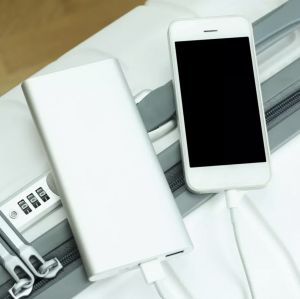The Importance of Knowing Lithium Battery Rules When Flying
Lithium batteries power our phones, laptops, power banks, and countless other gadgets that have become travel essentials. However, flying with lithium batteries requires a clear understanding of airline and aviation regulations. This knowledge ensures not only personal safety but also the smooth operation of flights. Since these batteries possess unique risks if mishandled, passengers must adhere to strict guidelines when packing them in either checked or carry-on luggage.
What Makes Lithium Batteries a Safety Concern During Flights?
Lithium batteries are praised for their high energy density and lightweight properties, but these same advantages can turn into hazards. The primary risk comes from thermal runaway, a process where a battery overheats uncontrollably, potentially causing smoke, extreme heat, or even fire. The confined and pressurized environment of an aircraft cabin or cargo hold means that any such incident could rapidly escalate. Hence airlines and regulatory bodies impose specific rules to reduce these risks to a minimum.
Carry-On vs. Checked Baggage: Lithium Battery Rules Explained
The key to traveling safely with lithium batteries lies in how they are packed:
- Carry-on luggage: Most airlines require lithium batteries to be transported in the cabin, not in checked baggage. This allows crew members to monitor battery safety and react instantly if a problem arises.
- Checked baggage: Some smaller batteries installed in devices may be allowed here, but loose or spare lithium batteries are generally prohibited from checked bags due to the higher risk they pose.
- Banned devices: Certain electronic items with non-compliant lithium batteries may be disallowed from all luggage for safety reasons.
It’s always smart to check your airline’s specific policies ahead of time, as rules can differ by carrier and country.
Understanding Watt-hour (Wh) Ratings for Lithium Batteries
Watt-hour is a unit that measures battery capacity. Knowing a battery’s Wh rating—which is typically printed on its label—is crucial for complying with flight regulations:
| Watt-Hour Rating | Typical Regulations |
|---|---|
| Below 100 Wh | Generally allowed in carry-on baggage without airline approval |
| 100 – 160 Wh | May require airline approval and limited quantity |
| Above 160 Wh | Usually prohibited |
Passengers should ensure they do not exceed these limits to avoid confiscated devices or travel delays.
What to Do in Case of a Lithium Battery Incident on a Flight
If a device with lithium batteries starts to overheat, emit smoke, or spark, swift action is critical. Passengers must immediately notify the flight crew rather than trying to handle the situation alone. Flight attendants receive specialized training to manage battery fires, using containment procedures and dedicated firefighting equipment designed for such hazards. Concealing the issue can escalate danger, so cooperation is a must for everyone’s safety.
Industry and Regulatory Measures to Enhance Air Travel Safety
The safety of lithium batteries on planes is governed by international standards and continuous improvements:
- Global standards: Bodies like the International Air Transport Association (IATA), Federal Aviation Administration (FAA), and European Union Aviation Safety Agency (EASA) establish unified rules.
- Battery testing: Certifications like UN 38.3 validate that batteries withstand flight conditions without critical failures.
- Crew training: Airlines regularly train flight attendants on emergency protocols related to battery incidents.
- Regulation updates: Rules evolve with new research and technology enhancements to stay ahead of potential risks.
Planning and Booking with Confidence: The Role of Transfer Services
Traveling with concerns about devices and batteries can be stressful, especially when coordinating airport transfers or rides to your destination. Platforms like LocalsRide.com offer peace of mind by allowing travelers to book transfers where they can select specific vehicle types, know the make and model of the car in advance, and review driver ratings. This transparency and convenience are a breath of fresh air compared with traditional taxi aggregators where such details remain unclear.
Why Passenger Awareness Matters
Ultimately, safe air travel with lithium batteries is a shared responsibility. Passengers who check regulations, pack batteries properly, and respond to risks responsibly contribute greatly to aviation safety. Doing so not only protects lives but also helps avoid travel disruptions caused by non-compliance.
At a Glance: Key Points to Remember
- Carry lithium batteries only in carry-on baggage unless your airline states otherwise.
- Always check the Watt-hour rating on batteries and abide by airline limits.
- Notify cabin crew immediately if you spot any overheating device or battery issue during flight.
- Use trusted transfer services like LocalsRide.com when planning rides to and from the airport, ensuring a reliable, comfortable experience with transparency in vehicle and driver choice.
Even detailed guides and honest reviews can’t replace the value of your own experience. On LocalsRide, you can hire cars with drivers from verified providers at reasonable prices, empowering you to make informed decisions without unnecessary expenses or unpleasant surprises. With a wide range of vehicles, clear fares, and extra options, LocalsRide offers convenience and affordability aligned with your needs. Book your ride today at LocalsRide.com and enjoy travel that puts safety and comfort first.
As lithium battery regulations tighten and evolve, the global tourism and travel landscape remains relatively stable in this regard. However, staying informed is always relevant to travelers and service providers alike. LocalsRide is committed to keeping pace with all such developments to offer up-to-date, transparent, and dependable transfer services worldwide. Start planning your next trip with confidence by securing your ride through LocalsRide.com.
In summary, flying safely with lithium batteries means understanding the risks, complying with airline regulations about packing and counts, reacting promptly to any onboard battery issues, and benefiting from the supportive framework of regulatory agencies and trained crews. Integrating this awareness into your travel preparation—including transfers to and from airports—ensures a seamless and secure journey. Whether traveling for business or pleasure, having the exact service, vehicle, and driver you prefer makes all the difference in enjoying a hassle-free experience from start to finish.

